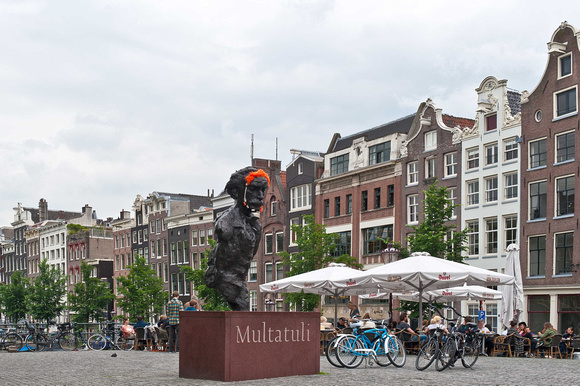The orange gets everywhere. A statue of the author Multatuli.
Eduard Douwes Dekker (2 March 1820 – 19 February 1887), better known by his pen name Multatuli (from Latin multa tuli, "I have carried much"), was a Dutch writer famous for his satirical novel, Max Havelaar (1860), which denounced the abuses of colonialism in the Dutch East Indies (today's Indonesia).
Dekker was born in Amsterdam. His father, a ship's captain, intended his son for trade, but this humdrum prospect disgusted him, and in 1838 he went out to Java and obtained a post as a civil servant. He moved from one posting to another, until, in 1851, he became assistant-resident at Ambon, in the Moluccas. In 1857 he was transferred to Lebak, in the Bantam residency of Java (now Banten province). By this time, however, all the secrets of Dutch administration were known to him, and he had begun to openly protest about the abuses of the colonial system. Consequently he was threatened with dismissal from his office for his openness of speech. Dekker resigned his appointment and returned to the Netherlands.
He was determined to expose in detail the scandals he had witnessed, and he began to do so in newspaper articles and pamphlets. Little notice, however, was taken of his protestations until, in 1860, he published his novel Max Havelaar under the pseudonym of Multatuli. Dekker's new pseudonym, which is derived from Latin, means, "I have suffered much", or, more literally "I have borne much" referring to himself, as well as, it is thought, to the victims of the injustices he saw. An attempt was made to suppress the inflammatory book, but in vain; it was read all over Europe. Colonialist apologists accused Dekker's horrific depictions of being hyperbolic. Multatuli now began his literary career, and published Love Letters (1861), which, in spite of their mild title, were mordant, unsparing satires.Although the literary merit of Multatuli's work was widely criticised, he received an unexpected and most valuable ally in Carel Vosmaer who published a book (The Sower 1874) praising him. He continued to write much, and to publish his miscellanies in uniform volumes called Ideas, of which seven appeared between 1862 and 1877 and also contain his novel Woutertje Pieterse.


